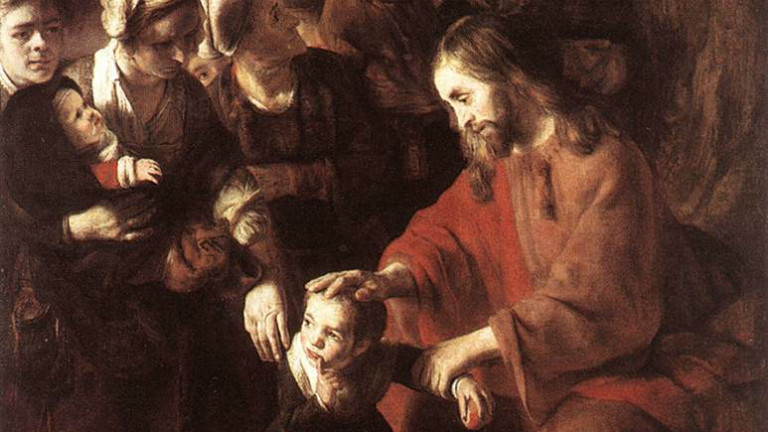Love Is Reconciliation of Desires
Lincoln Cannon
28 November 2015 (updated 3 January 2026)
The Mormon authoritative tradition clearly and repeatedly advocates the kind of love that would reconcile desires. As usual, Jesus sets the precedent, expressing his love as an act of reconciliation and inviting us to ask according to our desires:
“If ye abide in me, and my words abide in you, ye shall ask what ye will, and it shall be done unto you. Herein is my Father glorified, that ye bear much fruit; so shall ye be my disciples. As the Father hath loved me, so have I loved you: continue ye in my love.” (John 15: 7-9)
Of course, reconciliation works in both directions. Jesus anticipates, from our love for him, that we will in turn care for his desires:
“If ye keep my commandments, ye shall abide in my love; even as I have kept my Father’s commandments, and abide in his love.” (John 15: 10)
As if anticipating a hesitancy to interpret the love he advocates as truly requiring bi-directional reconciliation, Jesus states and repeats that he will do what we ask of him, before asking us to do what he asks of us:
“And whatsoever ye shall ask in my name, that will I do, that the Father may be glorified in the Son. If ye shall ask any thing in my name, I will do it. If ye love me, keep my commandments.” (John 14: 13-15)
Jesus then explains that this kind of love, asking and receiving according to desires, also empowers greater joy and even its fullness:
“These things have I spoken unto you, that my joy might remain in you, and [that] your joy might be full. This is my commandment, That ye love one another, as I have loved you.” (John 15: 11-12)
Joseph Smith elaborated on the relation between love and reconciliation:
“The inquiry is frequently made of me. ‘Wherein do you differ from others in your religious views?’ In reality an essence we do not differ so far in our religious views, but that we could all drink into one principle of love. One of the grand fundamental principles of ‘Mormonism’ is to receive truth, let it come from whence it may. We believe in the Great Elohim who sits enthroned in yonder heavens. So do the Presbyterians. If a skillful mechanic, in taking a welding heat, uses borax, alum, etc., and succeeds in welding together iron or steel more perfectly than any other mechanic, is he not deserving of praise? And if by the principles of truth I succeed in uniting men of all denominations in the bonds of love, shall I not have attained a good object? If I esteem mankind to be in error, shall I bear them down? No. I will lift them up, and in their own way too, if I cannot persuade them my way is better; and I will not seek to compel any man to believe as I do, only by the force of reasoning, for truth will cut its own way. Do you believe in Jesus Christ and the Gospel of salvation which he revealed? So do I. Christians should cease wrangling and contending with each other, and cultivate the principles of union and friendship in their midst; and they will do it before the millennium can be ushered in and Christ takes possession of His kingdom.” (Teachings of the Prophet Joseph Smith 313)
With these words, Joseph suggested he would reconcile others’ desires to his own by persuasion and reasoning. And if that wouldn’t work, he would reconcile his desires to others’ by building them up in their own way.
Reconciliation is easiest when desires do not conflict, but the scriptures exemplify the will to reconciliation even in conflict. For example, the Book of Mormon portrays Captain Moroni seeking reconciliation in the context of war. Upon gaining advantage over an enemy army, he challenges them with an appeal to their desires:
“I command you by all the desires which ye have for life, that ye deliver up your weapons of war unto us, and we will seek not your blood …” (Alma 44: 6)
War may bring to mind behaviors that oppress rather than reconcile desires. Where reconciliation would consider change within itself and invite change beyond itself, oppression would demand change beyond itself to comply with itself. Some experience a degree of joy in oppression of others’ desires, but such behavior tends to be self limiting. When we desire the marginalization or annihilation of others’ desires, they sooner or later respond by desiring to oppress our desires. In the least, they desire to oppress our desire to oppress them, in a vicious cycle. This suggests some constraints to reconciliation, as Captain Moroni illustrates, continuing to address the enemy:
“… we will spare your lives, if ye will go your way and come not again to war against us. And now, if ye do not this, behold, ye are in our hands, and I will command my men that they shall fall upon you, and inflict the wounds of death in your bodies, that ye may become extinct; and then we will see who shall have power over this people; yea, we will see who shall be brought into bondage.” (Alma 44: 6-7)
Although offering life to the enemy, Moroni conditions the offer on their agreement to end further oppression, and warns that disagreement would necessitate further counter oppression. Likewise, Joseph Smith, although preaching Christian reconciliation, prefaced his remarks with these words:
“It is a love of liberty which inspires my soul – civil and religious liberty to the whole of the human race. Love of liberty was diffused into my soul by my grandfathers while they dandled me on their knees; and shall I want friends? No.” (Teachings of the Prophet Joseph Smith 313)
Although Joseph, like Moroni, would seek reconciliation of conflicting desires, he would do so only to the extent that the conflicting desires remain compatible with a general liberty. Jesus, too, suggests such a constraint on reconciliation:
“But woe unto you, scribes and Pharisees, hypocrites! for ye shut up the kingdom of heaven against men: for ye neither go in [yourselves], neither suffer ye them that are entering to go in. Woe unto you, scribes and Pharisees, hypocrites! for ye devour widows’ houses, and for a pretence make long prayer: therefore ye shall receive the greater damnation … Woe unto you, scribes and Pharisees, hypocrites! because ye build the tombs of the prophets, and garnish the sepulchres of the righteous …” (Matt 23: 13-14, 29)
Here, Jesus, with exceptional severity, denounces the Pharisees for oppressing the spiritual and material desires of their community. Surely, the Pharisees would not desire the denouncement, and perhaps Jesus would not enjoy it, but the desire to oppress makes reconciliation impossible so long as it persists. Denouncement accomplished, Jesus adds:
“O Jerusalem, Jerusalem, [thou] that killest the prophets, and stonest them which are sent unto thee, how often would I have gathered thy children together, even as a hen gathereth her chickens under [her] wings, and ye would not! Behold, your house is left unto you desolate. For I say unto you, Ye shall not see me henceforth, till ye shall say, Blessed [is] he that cometh in the name of the Lord.” (Matt 23: 37-39)
Even in the face of oppressive desires, Jesus reminds the oppressors that he loves them, that he would reconcile with them, if they would allow him. He positions himself for that reconciliation, and asks the oppressor to reciprocate. Further, he exemplifies the extent to which we might seek reconciliation in the face of oppression. His words set the context:
“And behold it is written also, that thou shalt love thy neighbor and hate thine enemy; But behold I say unto you, love your enemies, bless them that curse you, do good to them that hate you, and pray for them who despitefully use you and persecute you; That ye may be the children of your Father who is in heaven; for he maketh his sun to rise on the evil and on the good.” (3 Nephi 12: 43-45)
Jesus says that God, whose purpose is our fullness of joy, makes his sun to rise even over the oppressor. But that’s not as far as the reconciliation would go.
“And now, the plan of mercy could not be brought about except an atonement should be made; therefore God himself atoneth for the sins of the world, to bring about the plan of mercy, to appease the demands of justice, that God might be a perfect, just God, and a merciful God also.” (Alma 42: 15)
On the one hand, we desire justice. On the other, we desire mercy. Some may consider such tensions irredeemable. But going beyond any supposition of permanent resistance, the scriptures attribute to God a radical idealization of reconciliation: the Atonement. The scriptures characterize the extent and magnitude of this great reconciliation as necessitating even divine suffering:
“Which suffering caused myself, even God, the greatest of all, to tremble because of pain, and to bleed at every pore, and to suffer both body and spirit – and would that I might not drink the bitter cup, and shrink …” (Doctrine and Covenants 19:18)
In the New Testament, anticipating his death, Jesus observes,
“Greater love hath no man than this, that a man lay down his life for his friends.” (John 15: 13)
Perhaps responding to concern that he was merely succumbing to oppression rather than seeking difficult reconciliation, Jesus also claims,
“Therefore doth my Father love me, because I lay down my life, that I might take it again. No man taketh it from me, but I lay it down of myself. I have power to lay it down, and I have power to take it again. This commandment have I received of my Father.” (John 10: 17-18)
In the ideal of the Atonement and the example of Jesus, we might see the extent to which God would seek to reconcile desires. There is the logical constraint, to be sure, that reconciliation cannot happen at the cost of annihilating one’s self. But within that constraint, evidently even divine suffering is not too much to ask.
In that grim context, Jesus invites us to follow his example of seeking reconciliation. And Mormon ritual emphasizes his invitation, resisting any passive supposition that the invitation should be severely limited in scope. Beginning with baptism and through temple rites, Mormons take on the name of Christ.
“O God, the Eternal Father, we ask thee in the name of thy Son, Jesus Christ, to bless and sanctify this bread to the souls of all those who partake of it; that they may eat in remembrance of the body of thy Son, and witness unto thee, O God, the Eternal Father, that they are willing to take upon them the name of thy Son, and always remember him, and keep his commandments which he hath given them, that they may always have his Spirit to be with them. Amen.” (Moroni 4: 3)
In this prayer, offered as part of the Mormon communion, we take the name of Christ, expressing desire to think and act as Christ. This is the desire of reconcilers, and of saviors, as expressed by Joseph Smith:
“For they were set to be a light unto the world, and to be the saviors of men; And inasmuch as they are not the saviors of men, they are as salt that has lost its savor, and is thenceforth good for nothing but to be cast out and trodden under foot of men.” (Doctrine and Covenants 103:9-10)
According to Mormonism, then, this is the ultimate expression of love: that we would commit to reconciliation of desires, not merely our own but also those of others, even to the extent exemplified by Jesus.
Desire-Based Ethics
This is one of a series of articles in which I model a desire-based ethics by drawing on the Mormon authoritative tradition. While the basis of the model will appeal most to Mormons, I believe the principles derived from that basis will interest many non-Mormons, both religious and secular. Here's a list, in chronological order, of the articles in this series:




